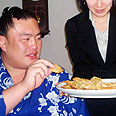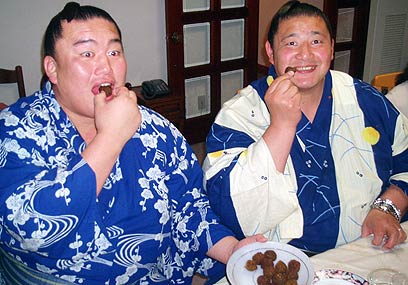
Tehina cookies for desert
צילום: איריס ז'ורלט
Falafel and sumo wrestling – what a combination!
It's not often that a six-foot tall woman can call other people 'enormous' in Japan, but when Iris Georlette met up recently with a group of sumo wrestlers, it was absolutely one such occasion. And for the curious, they'll soon be on their way to Israel
TOKYO - P. called to tell me the latest news with great excitement: “M. is going to host a delegation of sumo wrestlers in her home. You know that next month the entire stable is coming to Israel. And M. is hysterical: she doesn’t know what to prepare, and even more important, how much to prepare.”
I immediately call M.’s husband. “Is it true, the entire stable?” I ask. “Are you nuts?” he laughs, “do you want the house to collapse? Only three of them are coming.” “And will the Bulgarian come?” I ask, hopeful, about my favorite wrestler. “No, he isn’t coming, but three others will come. It’s really worth it. I promise you.” I swear I’ll wash dishes if necessary, as long as they allow me to touch the glory and get permission for a photo opp.
That’s how I arrive at the appointed hour and see them hanging over the sides of the chair. The hosts rush me immediately through the hallway to the kitchen for a photo opp with the housekeeper and the security officer so as not to disturb the gods while they eat.
Making plans
I ask to assist in serving, and am met with a deadly refusal. The photo op will take place only during dessert. That being the case, I content myself with viewing the leftovers that come back to the kitchen including falafel balls, pita bread, hummus, tehina, Moroccan carrot salad, majadera, enormous kebabs (presumably the special sumo version), chopped cabbage salad, and Israeli vegetable salad.
Aside from menu planning for the local cultural heroes, the issue of quantities is the critical question this evening: It looks like the quantities are planned in the traditional way, as in every good Polish Jewish home, since there are lots of leftovers. I am so excited that I cannot eat. It’s not every day that I get to meet major sumo wrestlers up close.
Enormous
The tehina cookies mark the beginning of the photo op. I enter the room in fear and trepidation, with a pile of business cards, as is the Japanese custom. The three wrestlers rise as one and the first thing that hits me is their height. They are truly enormous, and a woman who is just under six feet tall doesn’t often get to say that in our sunny country.

Love falafel. Sumo wrestlers (Photo: Iris Georlette)
After that I notice how huge they are, their amazing clothing, and their hairstyles. One of their beautiful hairstyles will be trimmed in a special ceremony toward the end of the month, my hosts explain to me. The sumo wrestlers are very impressive, and my friend S. also tells me that many Japanese women find them especially attractive (and not just for their huge salaries).
I ask them if they are excited to be visiting Israel, and they nod happily. They don’t know much about what to expect and they are tasting our delicacies for the first time, but if the quantities of food they’ve consumed this evening are any indication, the encounter with Israeli cuisine has gotten off to a good start.
Downing falafel
I ask what food they liked best this evening. “The meat,” they answer without confusion, “and also the falafel and hummus,” they say while throwing the falafel balls in the air and swallowing them whole.
“And what do y you eat every day?” I take this rare opportunity to inquire, “is it really chanko-nabe?” “Yes, chanko-nabe,” says the most senior wrestler. “Chan is the father and ko is the child,” he explains. “In the past the idea was that the father and the child would eat together. And that’s how it’s also done in the stable—we, the wrestlers, eat together. The senior wrestlers with the junior wrestlers.
In addition, the head of the stable eats with the sumo apprentices. Out of the same bowl, actually. "Our menu is very balanced,” he assures me. “And what about the alcohol?” I wink. “Of course,” they smile. “Is there a minimum weight for being a sumo wrestler?” I ask. “75 kilograms (165 pounds),” is the definitive answer. Some of us shake our head sadly: If we don’t start diets soon, we’ll be able to be sumo wrestlers, too.
I do a series of photo shoots with the champions, enjoying the rare opportunity to feel small and fragile, and my wrestlers for the evening are glad to oblige. Afterwards they examine with great interest books with photos of the Caesarea Amphitheater, where they will be appearing soon. I tell them that it is located across from the ocean, and assure them that this is one of the most beautiful locations in the country, and that there is nowhere more appropriate for their performance.
Preparing Chanko-nabe
In honor of our guests who are going to appear in the Holy Land, straight from the Sadogatake sumo stable, here is a recipe for a Zionist version of chanko-nabe.
Chanko-nabe
Ingredients
1 kilogram (2 lbs) of chicken quarters
Fish steaks chopped into 1 inch cubes
½ coarsely chopped cabbage
1 cup celery root and 1 cup celery leaves, coarsely chopped
1 leek, sliced
200 grams mushrooms
2 coarsely chopped carrots
2 coarsely chopped turnips
300 grams cubed hard tofu
10 cups of dashi sauce prepared according to package instructions
2 tbs. Japanese soy sauce
2 tbs. Aji Mirin (sweet rice wine)
Place all ingredients in a pot, place on a high flame, and bring to a boil.
Lower the flame and cook for about another half hour, or until the chicken is done.
Taste and adjust the seasoning. Pour into small bowls and serve with a lot of beer.
Itadakimas!










